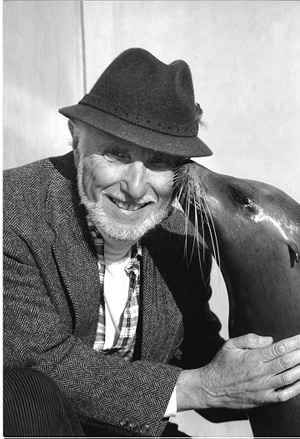Ronald Schusterman, a pioneering marine mammal scientist and an expert in animal behavior and comparative psychology, died on February 11 at Stanford Hospital in Palo Alto after a brief hospitalization. He was 77.
A resident of La Selva Beach, Schusterman was a research marine biologist and adjunct professor of ocean sciences at the University of California, Santa Cruz, from 1985 until his retirement in 2003. He was best known for his research on hearing, vision, and cognitive abilities of marine mammals. At UCSC's Long Marine Laboratory, he worked with California sea lions, harbor seals, and elephant seals, conducting careful experiments to understand how they perceive and think about the world around them.
"Ron carried out truly pioneering work on cognition and sensory physiology of marine mammals. He was an exceptional experimentalist, and his research has stood the test of time, ranking among the classic works on marine mammals and animal cognition," said Daniel Costa, professor of ecology and evolutionary biology at UCSC.
Born in New York City and raised in the Bronx, Schusterman earned a B.A. in history and political science at Brooklyn College and both an M.A. and Ph.D. in psychology at Florida State University. His first research position was at the Yerkes Laboratory of Primate Biology in Florida, where he investigated the cognitive and social behavior of chimpanzees, gibbons, and monkeys. He maintained a lifelong interest in primatology and could produce startlingly realistic calls of gibbons, howler monkeys, and other primates.
In 1963, Schusterman was recruited by the Stanford Research Institute (SRI) in Palo Alto to study the behavior and sensory physiology of pinnipeds (seals and sea lions). There he helped debunk the idea that pinnipeds use echolocation like dolphins and bats do. He continued to study hearing and vision in pinnipeds, first at SRI and later at California State University at Hayward (now CSU East Bay), where he held a joint appointment in the psychology and biology departments. In 1985, he moved his research program to UCSC's Long Marine Laboratory, where he helped establish the lab's reputation as a leading center for marine mammal research.
Schusterman's work with California sea lions included an ambitious and long-running program involving artificial sign language. This led to important contributions in the areas of language learning and the foundations of complex cognition in humans and other animals.
"He taught sea lions sign language and showed that they could understand syntax and a series of commands that formed a very simple artificial language," Costa said. "Until Ron's work, only chimps and gorillas, and later dolphins, were thought to be capable of that."
His studies of hearing in marine mammals helped to raise awareness of the potential impacts of manmade noise in the ocean environment. He also studied how a variety of marine mammals use sound to communicate, including recent work on the vocal behavior and learning capabilities of walruses.
The research program Schusterman established at UCSC has continued since his retirement under the direction of Colleen Reichmuth, a research biologist who began working in Schusterman's lab as an undergraduate and went on to earn her Ph.D. with him. According to Reichmuth, Schusterman used his extensive knowledge of conditioning and learning theory to develop some of the first, most creative, and most enduring approaches to training and studying marine mammals in captivity. He remained involved in the research program after his retirement and continued to mentor a small group of graduate students at UCSC.
"He was extremely influential, not only as a pioneer in the field of marine mammal research, but also as a mentor to many of the most productive scientists in the field," Reichmuth said.
A founding and honorary member of the Society for Marine Mammalogy, Schusterman was a fellow of the Animal Behavior Society, Acoustical Society of America, American Psychological Association, American Association for the Advancement of Science, and the California Academy of Sciences.
He is survived by his wife Francie Moore Schusterman; his daughters Marisa De Mello, Nikki Montez, and Lesli Schusterman; and seven grandchildren. In lieu of flowers, donations in his memory may be made to the Palo Alto Medical Clinic Cardiac Research Fund or to the Pinniped Cognition & Sensory Systems Laboratory at UCSC. A memorial service is being planned for Sunday, February 28. For more information, contact info@pinnipedlab.org.



